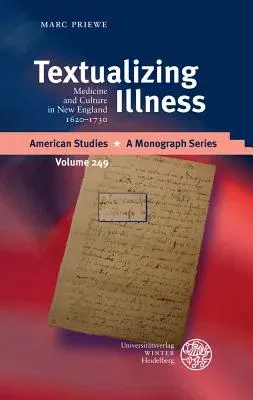Marc Priewe
(Author)Textualizing Illness: Medicine and Culture in New England 1620-1730Hardcover, 1 July 2014

Qty
1
Turbo
Ships in 2 - 3 days
Only 4 left
Free Delivery
Cash on Delivery
15 Days
Free Returns
Secure Checkout

Part of Series
American Studies - A Monograph
Print Length
408 pages
Language
English
Publisher
Universitatsverlag Winter
Date Published
1 Jul 2014
ISBN-10
3825363627
ISBN-13
9783825363628
Description
Product Details
Author:
Book Format:
Hardcover
Country of Origin:
US
Date Published:
1 July 2014
Dimensions:
21.34 x
14.48 x
3.05 cm
ISBN-10:
3825363627
ISBN-13:
9783825363628
Language:
English
Location:
Heidelberg
Pages:
408
Publisher:
Weight:
566.99 gm